-
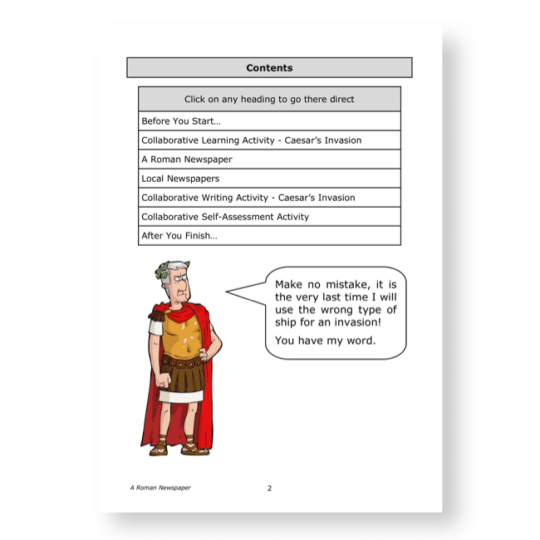

A Roman Newspaper
£3.00 Add to basket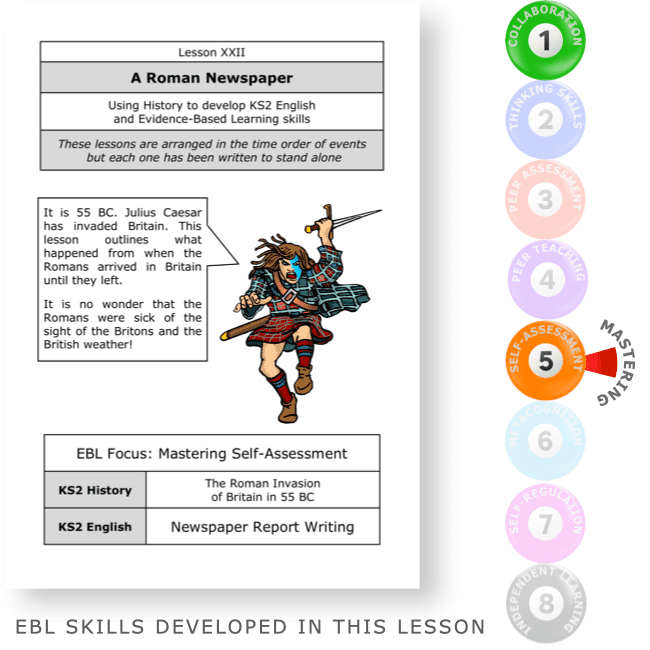 £3.00Add to basket
£3.00Add to basketIt is 55 BC. Julius Caesar has invaded Britain. This lesson outlines what happened from when the Romans arrived in Britain until they left.
It is no wonder that the Romans were sick of the sight of the Britons and the British weather!
As well as English (writing a newspaper report) and history skills the Evidence-Based Learning skills developed in this lesson includes collaborative learning. This lesson also offers pupils the opportunity to master self-assessment.
VIEW -

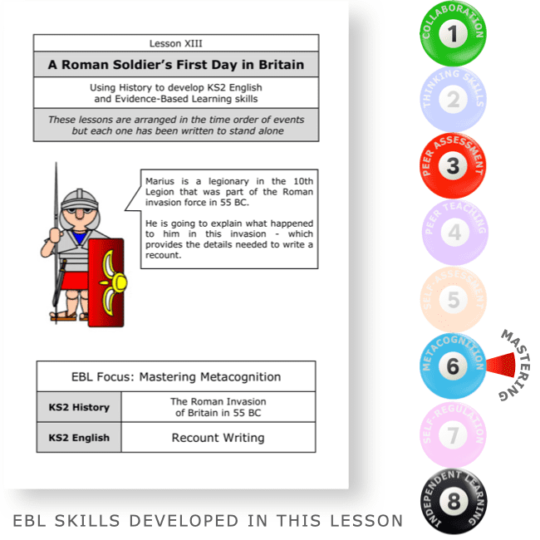
A Roman Soldier’s First Day in Britain
£3.00 Add to basket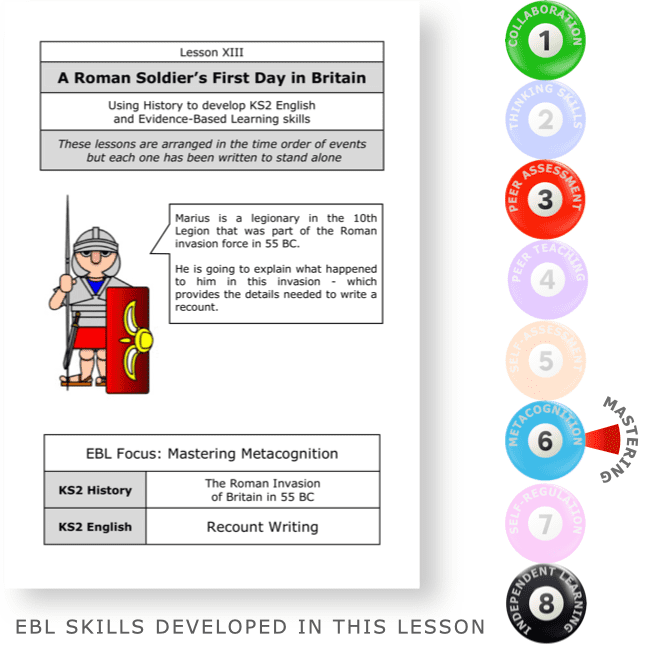 £3.00Add to basket
£3.00Add to basketMarius is a legionary in the 10th Legion that was part of the Roman invasion force in 55 BC. He is going to explain what happened to him in this invasion – which provides the details needed to write a recount.
As well as English (writing a recount) and history skills the Evidence-Based Learning skills developed in this lesson include collaborative learning, peer assessment and independent learning. This lesson also offers pupils the opportunity to master metacognition.
VIEW -

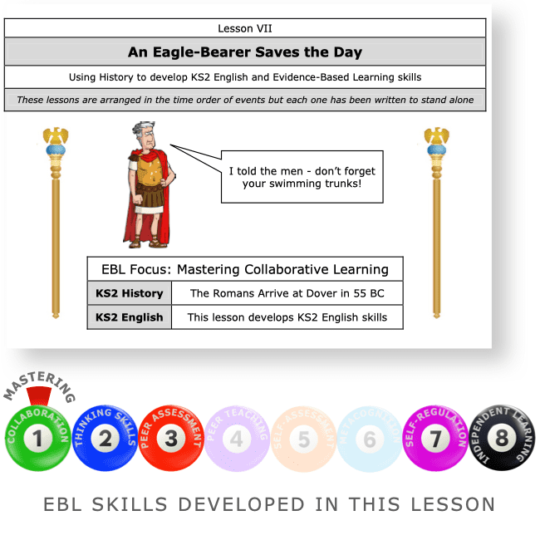
An Eagle-Bearer Saves the Day
£3.00 Add to basket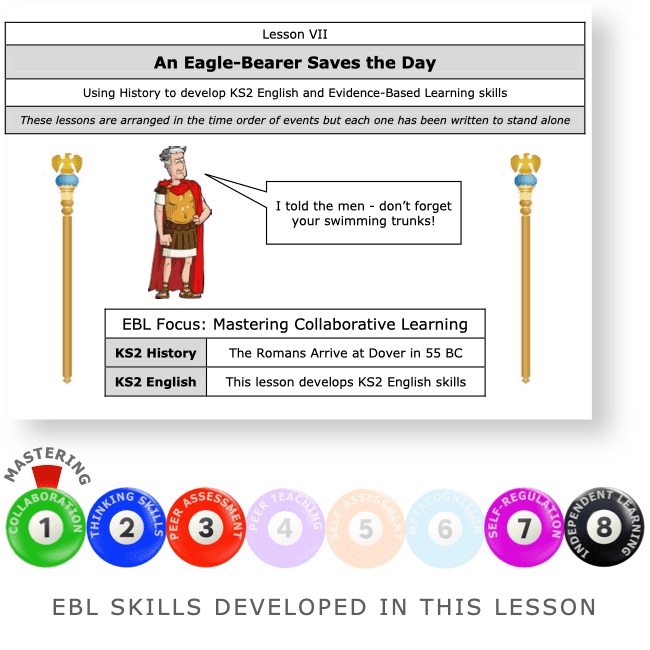 £3.00Add to basket
£3.00Add to basketJulius Caesar has just crossed the English Channel to invade Britain in 55 BC. He had to find another beach to land his soldiers on as the first beach that he sailed to (Dover) had fierce Britons waiting on the cliff tops and was too narrow.
When his ships arrived at the next beach, they could not get close to the shore, so he ordered his men to jump off the ships into the sea and wade ashore. When the order to jump was given, the men refused to jump. However, one soldier, an eagle-bearer, encouraged the others to jump in after him – and they did. Without him, the invasion might not have taken place.
As well as English and history skills the Evidence-Based Learning skills developed in this lesson include independent learning, thinking skills and self-regulation. This lesson also offers pupils the opportunity to master collaborative learning.
VIEW -


An Interview with Julius Caesar
£3.00 Add to basket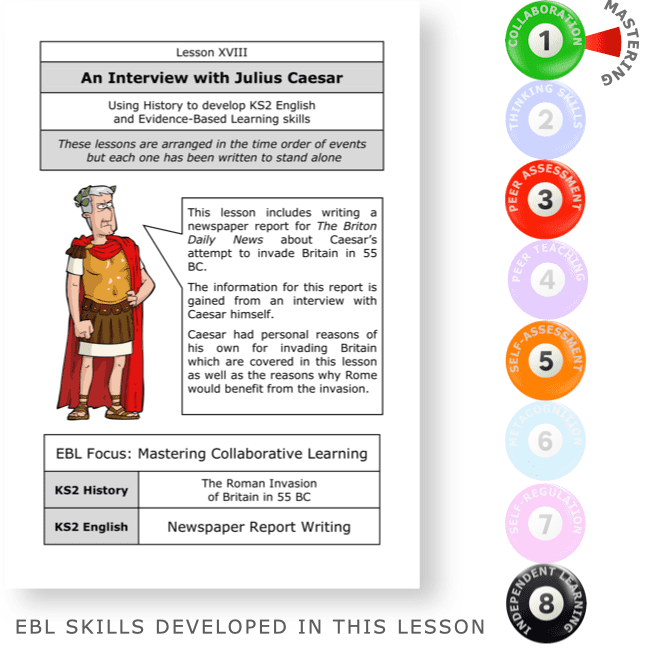 £3.00Add to basket
£3.00Add to basketThis lesson includes writing a newspaper report for The Briton Daily News about Caesar’s attempt to invade Britain in 55 BC. The information for this report is gained from an interview with Caesar himself.
Caesar had personal reasons of his own for invading Britain which are covered in this lesson as well as the reasons why Rome would benefit from the invasion.
As well as English (writing a newspaper report) and history skills the Evidence-Based Learning skills developed in this lesson include independent learning, peer and self-assessment. This lesson also offers pupils the opportunity to master collaborative learning.
VIEW -
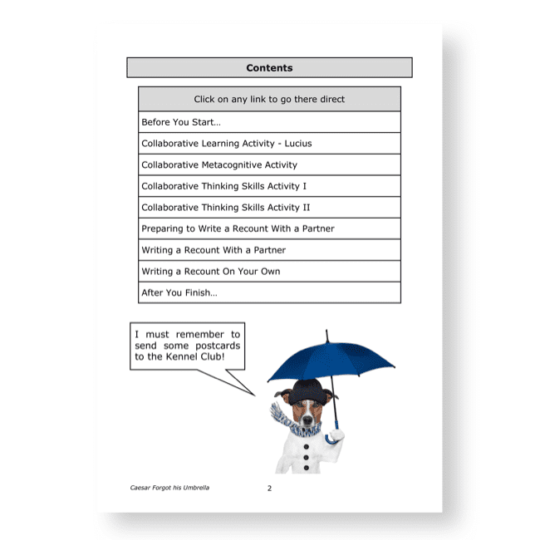
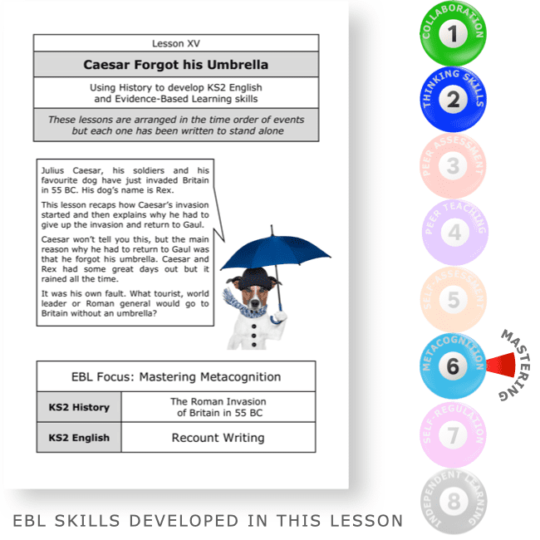
Caesar Forgot His Umbrella
£3.00 Add to basket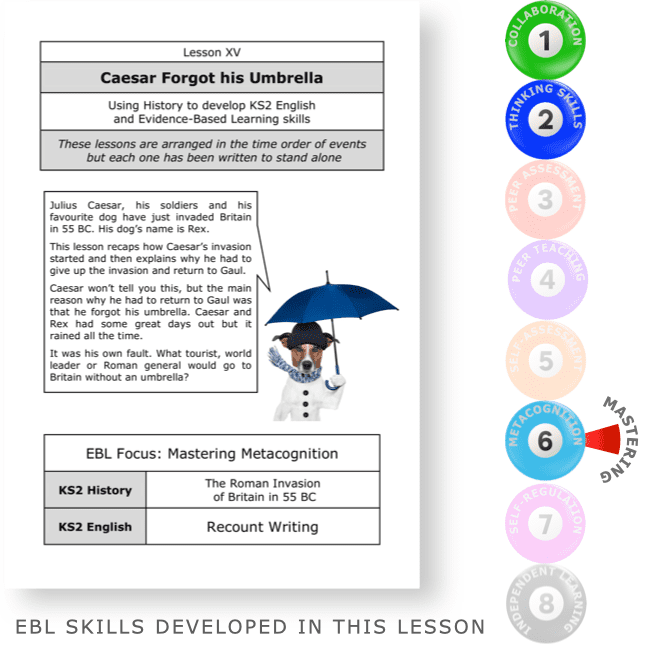 £3.00Add to basket
£3.00Add to basketJulius Caesar, his soldiers and his favourite dog have just invaded Britain in 55 BC. His dog’s name is Rex. This lesson recaps how Caesar’s invasion started and then explains why he had to give up the invasion and return to Gaul.
Caesar won’t tell you this, but the main reason why he had to return to Gaul was that he forgot his umbrella. Caesar and Rex had some great days out but it rained all the time. It was his own fault. What tourist, world leader or Roman general would go to Britain without an umbrella?
As well as English (writing a recount) and history skills the Evidence-Based Learning skills developed in this lesson include collaborative learning and self-assessment. This lesson also offers pupils the opportunity to master metacognition.
VIEW -
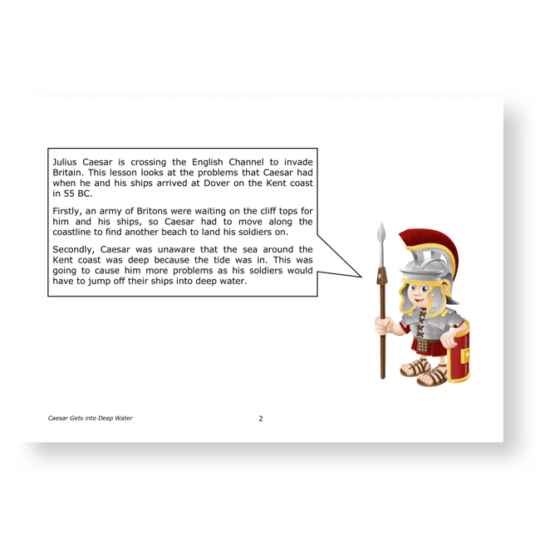
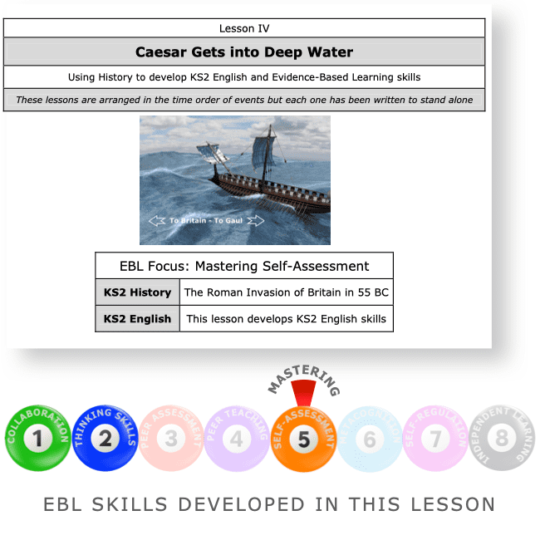
Caesar Gets into Deep Water
£3.00 Add to basket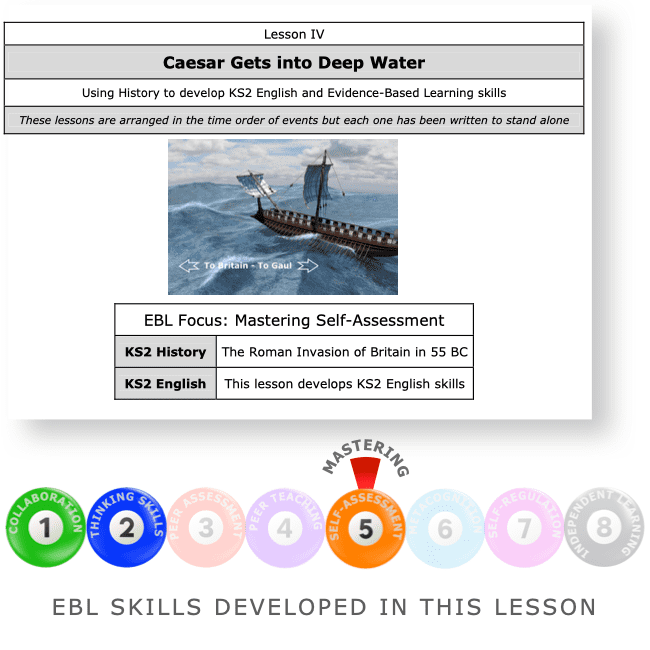 £3.00Add to basket
£3.00Add to basketJulius Caesar is crossing the English Channel to invade Britain. This lesson looks at the problems that Caesar had when he and his ships arrived at Dover on the Kent coast in 55 BC.
Firstly, an army of Britons were waiting on the cliff tops for him and his ships, so Caesar had to move along the coastline to find another beach to land his soldiers on.
Secondly, Caesar was unaware that the sea around the Kent coast was deep because the tide was in. This was going to cause him more problems as his soldiers would have to jump off their ships into deep water.
As well as English and history skills the Evidence-Based Learning skills developed in this lesson include collaborative learning and thinking skills. This lesson also offers pupils the opportunity to master self-assessment.
VIEW -


Caesar Has Big Plans
£3.00 Add to basket £3.00Add to basket
£3.00Add to basketThis lesson explains how the Roman invasion of Britain was just part of Caesar’s bigger plan to rule Rome and its empire. It also has a summary of the events in the first part of the invasion in 55 BC. Things didn’t go that well for Caesar, so he might have to give it another go next year!
As well as English and history skills the Evidence-Based Learning skills developed in this lesson include collaborative learning, self-assessment and thinking skills. This lesson also offers pupils the opportunity to master self-regulation.
VIEW -


Caesar Sails Back to Gaul
£3.00 Add to basket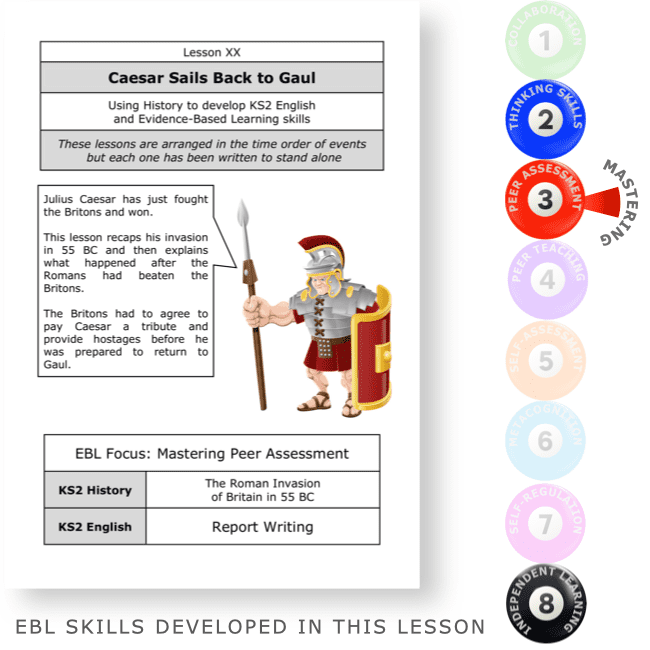 £3.00Add to basket
£3.00Add to basketJulius Caesar has just fought the Britons and won. This lesson recaps his invasion in 55 BC and then explains what happened after the Romans had beaten the Britons. The Britons had to agree to pay Caesar a tribute and provide hostages before he was prepared to return to Gaul.
As well as English (writing a report) and history skills the Evidence-Based Learning skills developed in this lesson include independent learning and thinking skills. This lesson also offers pupils the opportunity to master peer assessment.
VIEW -


Caesar Sails Without his Cavalry
£3.00 Add to basket £3.00Add to basket
£3.00Add to basketJulius Caesar invaded Britain but the Britons were waiting for him. This lesson recaps the start of this invasion in 55 BC.
As well as English and history skills the Evidence-Based Learning skills developed in this lesson includes thinking skills. This lesson also offers pupils the opportunity to master collaborative learning.
VIEW -


Caesar’s Own Account of the Invasion
£3.00 Add to basket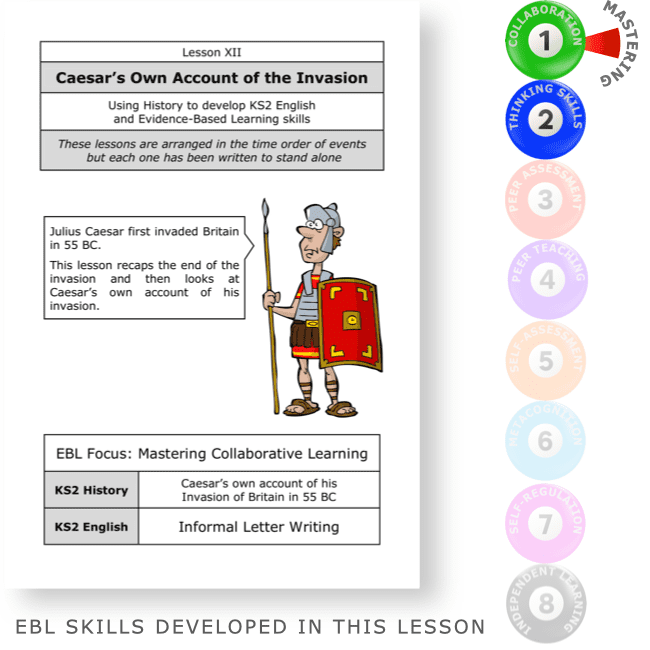 £3.00Add to basket
£3.00Add to basketJulius Caesar first invaded Britain in 55 BC. This lesson recaps the end of the invasion and then looks at Caesar’s own account of his invasion.
As well as English (writing an informal letter) and history skills the Evidence-Based Learning skills developed in this lesson includes thinking skills. This lesson also offers pupils the opportunity to master collaborative learning.
VIEW -


Caesar’s Three Big Problems
£3.00 Add to basket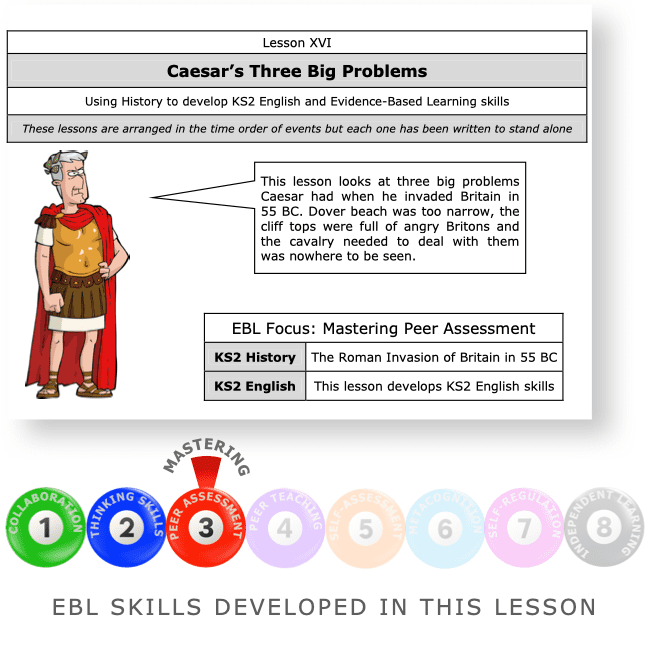 £3.00Add to basket
£3.00Add to basketThis lesson looks at three big problems Caesar had when he invaded Britain in 55 BC. Dover beach was too narrow, the cliff tops were full of angry Britons and the cavalry needed to deal with them was nowhere to be seen.
As well as English and history skills the Evidence-Based Learning skills developed in this lesson include collaborative learning and thinking skills. This lesson also offers pupils the opportunity to master peer assessment.
VIEW -


Caesar’s Dog Goes on Holiday
£3.00 Add to basket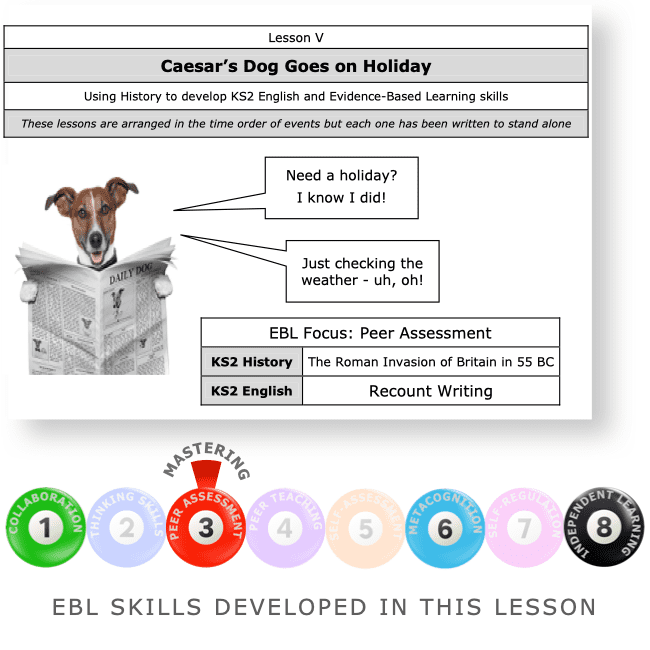 £3.00Add to basket
£3.00Add to basketThis lesson offers a light-hearted look at Caesar’s first invasion of Britain in 55 BC from the perspective of his (imaginary) dog called Rexus. Rexus is not invading of course – he is going on holiday!
As well as English (writing a recount with a partner) and history skills the Evidence-Based Learning skills developed in this lesson include collaborative learning, independent learning and metacognition. This lesson also offers pupils the opportunity to master peer assessment.
VIEW -


Caesar’s Parrot Enjoys an Awayday
£3.00 Add to basket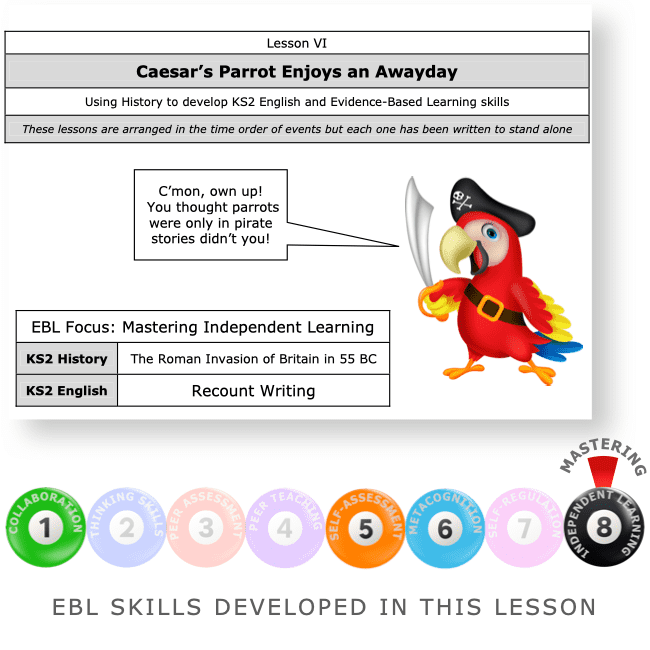 £3.00Add to basket
£3.00Add to basketThis lesson offers a light-hearted look at Caesar’s first invasion of Britain in 55 BC from the perspective of his (imaginary) parrot called Capitano. Capitano is not invading of course – he is going on an awayday!
As well as English (writing a recount on their own) and history skills the Evidence-Based Learning skills developed in this lesson include metacognition and self-assessment. This lesson also offers pupils the opportunity to master independent learning.
VIEW -
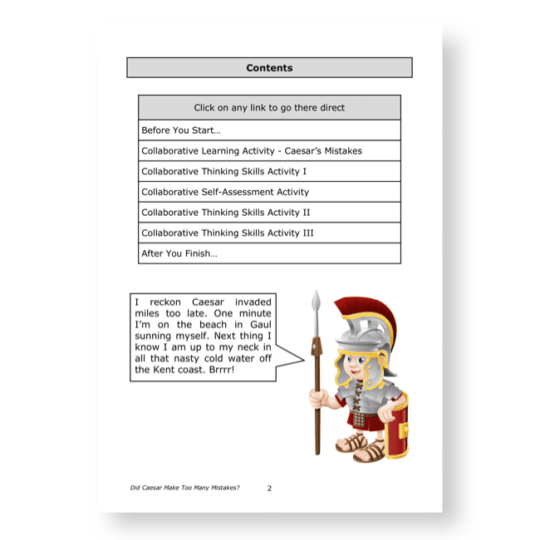

Did Caesar Make Too Many Mistakes
£3.00 Add to basket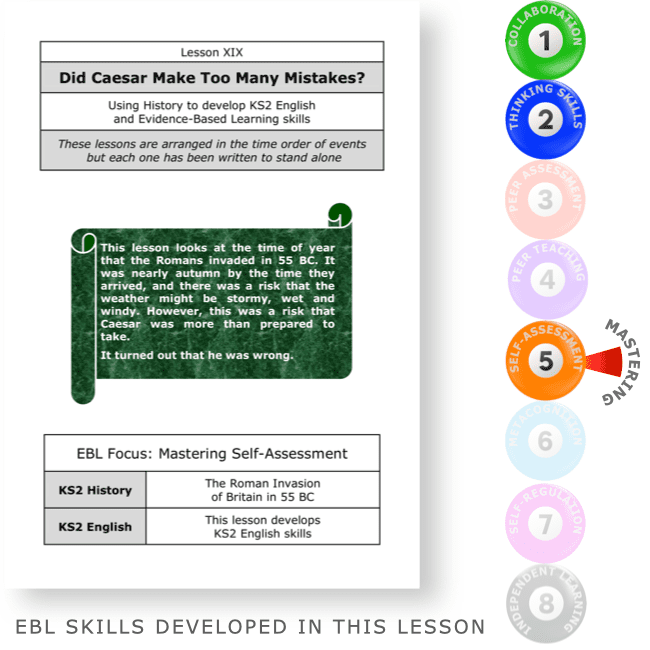 £3.00Add to basket
£3.00Add to basketThis lesson looks at the time of year that the Romans invaded in 55 BC. It was nearly autumn by the time they arrived, and there was a risk that the weather might be stormy, wet and windy. However, this was a risk that Caesar was more than prepared to take. It turned out that he was wrong.
As well as English and history skills the Evidence-Based Learning skills developed in this lesson include collaborative learning and self-assessment. This lesson also offers pupils the opportunity to master self-assessment.
VIEW -


Did the Britons have a Spy
£3.00 Add to basket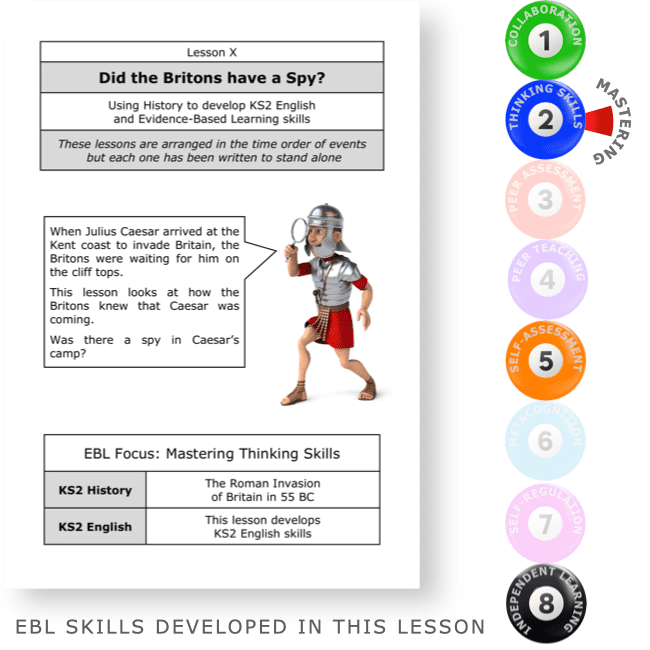 £3.00Add to basket
£3.00Add to basketWhen Julius Caesar arrived at the Kent coast to invade Britain, the Britons were waiting for him on the cliff tops. This lesson looks at how the Britons knew that Caesar was coming. Was there a spy in Caesar’s camp?
As well as English and history skills the Evidence-Based Learning skills developed in this lesson include collaborative learning and self-assessment. This lesson also offers pupils the opportunity to master thinking skills.
VIEW -
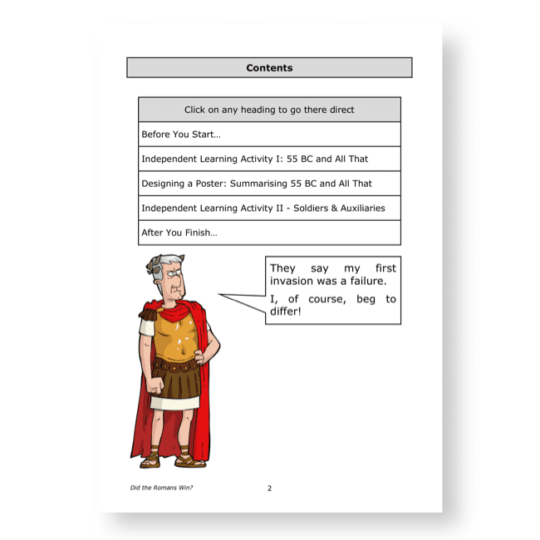
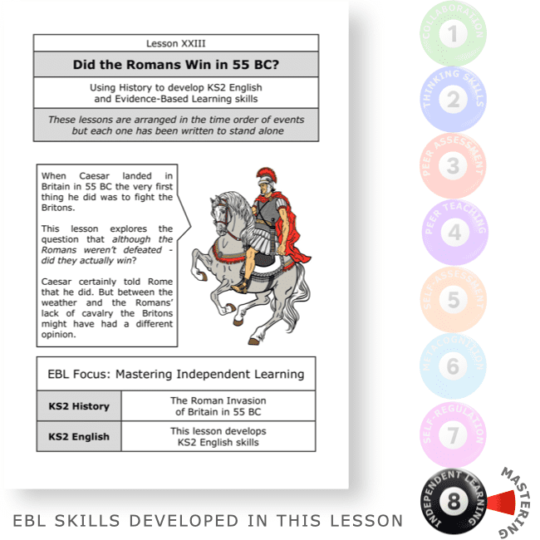
Did the Romans Win in 55 BC?
£3.00 Add to basket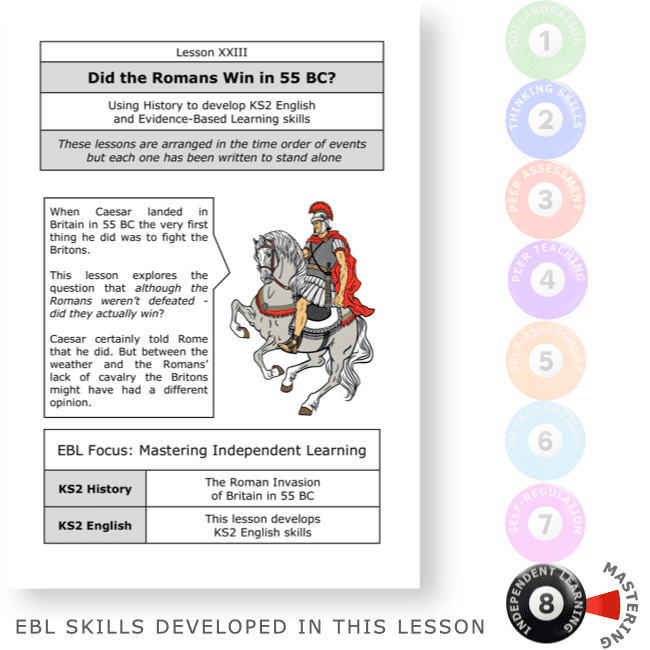 £3.00Add to basket
£3.00Add to basketWhen Caesar landed in Britain in 55 BC the very first thing he did was to fight the Britons. This lesson explores the question that although the Romans weren’t defeated – did they actually win? Caesar certainly told Rome that he did. But between the weather and the Romans’ lack of cavalry the Britons might have had a different opinion.
As well as English (designing a poster) and history skills the Evidence-Based Learning skills developed in this lesson offer pupils the opportunity to master independent learning.
VIEW -
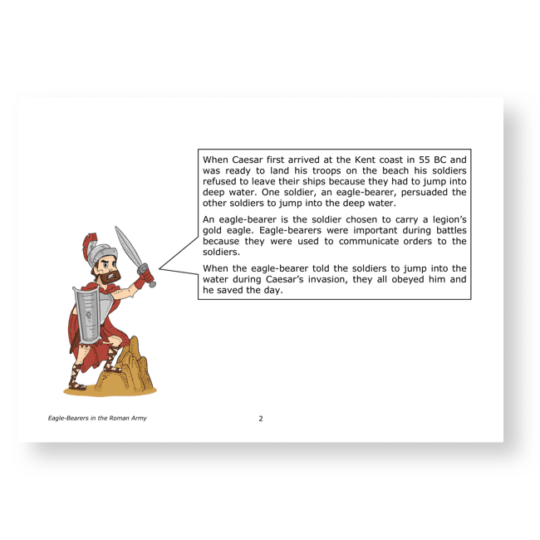
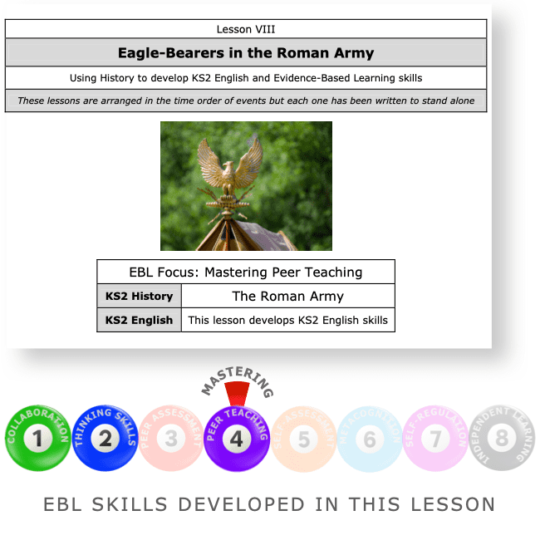
Eagle-Bearers in the Roman Army
£3.00 Add to basket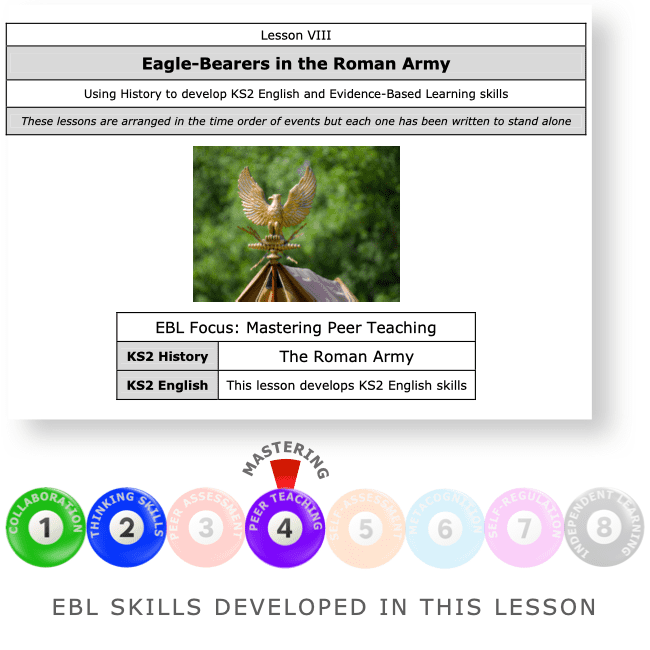 £3.00Add to basket
£3.00Add to basketWhen Caesar first arrived at the Kent coast in 55 BC and was ready to land his troops on the beach his soldiers refused to leave their ships because they had to jump into deep water. One soldier, an eagle-bearer, persuaded the other soldiers to jump into the deep water.
An eagle-bearer is the soldier chosen to carry a legion’s gold eagle. Eagle-bearers were important during battles because they were used to communicate orders to the soldiers. When the eagle-bearer told the soldiers to jump into the water during Caesar’s invasion, they all obeyed him and he saved the day.
As well as English and history skills the Evidence-Based Learning skills developed in this lesson include collaborative learning and metacognition. This lesson also offers pupils the opportunity to master peer teaching.
VIEW -


Even More Problems for Caesar
£3.00 Add to basket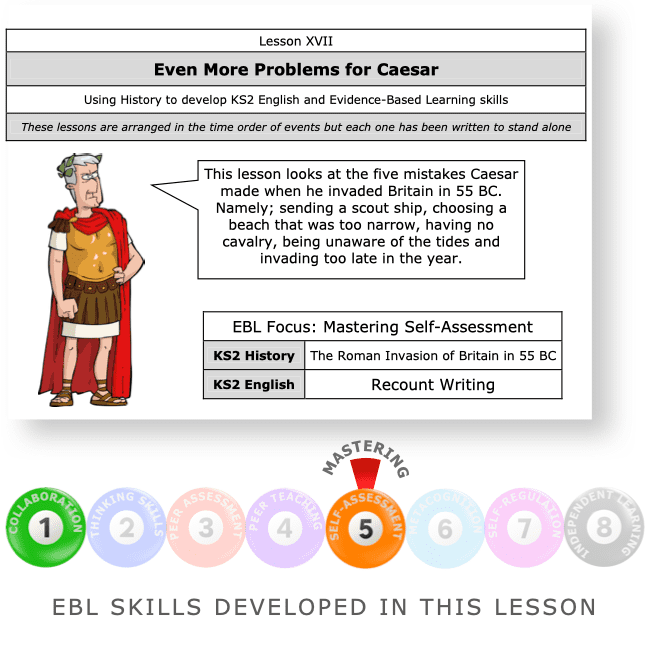 £3.00Add to basket
£3.00Add to basketThis lesson looks at the five mistakes Caesar made when he invaded Britain in 55 BC. Namely; sending a scout ship, choosing a beach that was too narrow, having no cavalry, being unaware of the tides and invading too late in the year.
As well as English (writing a recount) and history skills the Evidence-Based Learning skills developed in this lesson includes collaborative learning. This lesson also offers pupils the opportunity to master self-assessment.
VIEW -
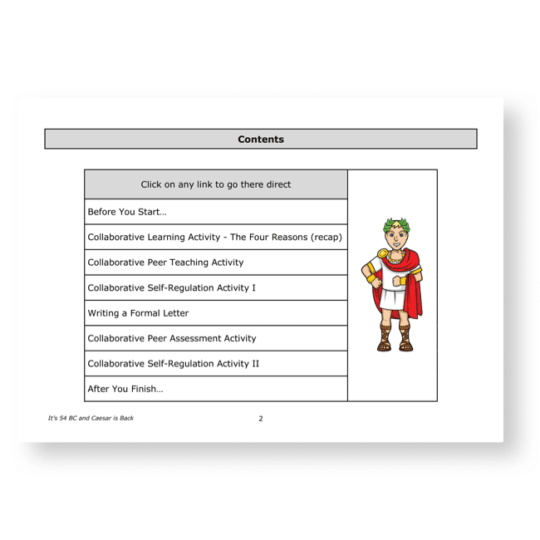
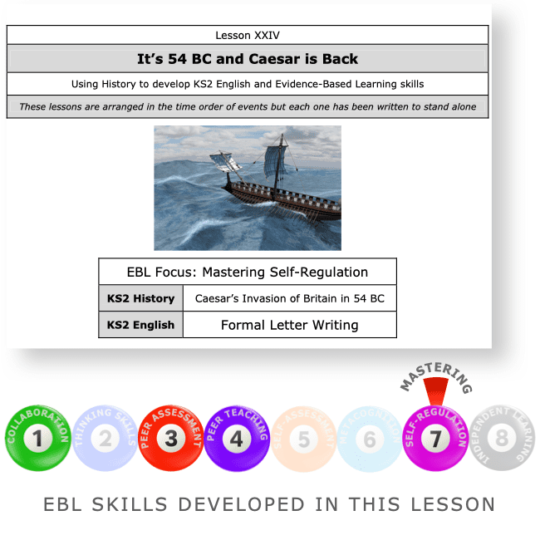
It’s 54 BC and Caesar is Back
£3.00 Add to basket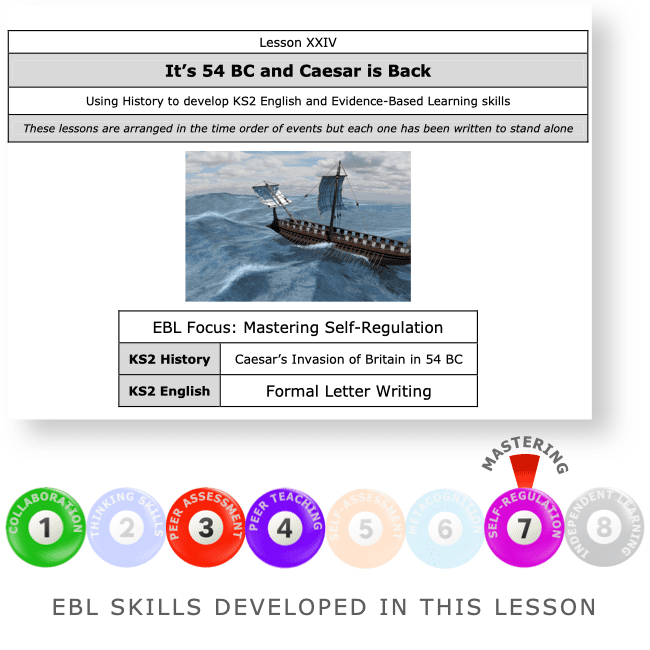 £3.00Add to basket
£3.00Add to basketThis lesson uses the mechanism of a formal letter to explore the fact that although Caesar’s first invasion in 55 BC was a failure, his second invasion a year later in 54 BC was a success. This lesson also considers why invading Britain was extremely important for Caesar and for the Roman Empire.
As well as English (writing a formal letter) and history skills the Evidence-Based Learning skills developed in this lesson include collaborative learning, peer teaching and peer assessment. This lesson also offers pupils the opportunity to master self-regulation.
VIEW -


Nine Reasons Why Caesar Invaded Britain
£3.00 Add to basket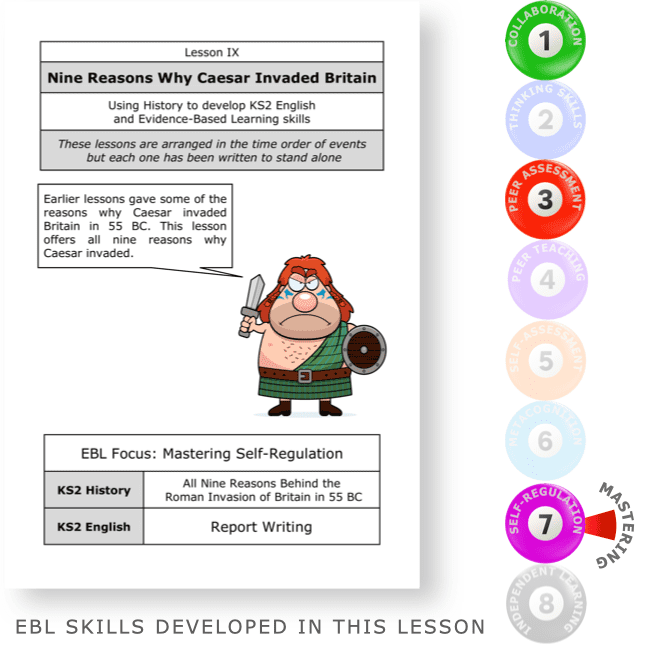 £3.00Add to basket
£3.00Add to basketEarlier lessons gave some of the reasons why Caesar invaded Britain in 55 BC. This lesson offers all nine reasons why Caesar invaded.
As well as English (writing a report) and history skills the Evidence-Based Learning skills developed in this lesson include collaborative learning and peer assessment. This lesson also offers pupils the opportunity to master self-regulation.
VIEW -


Romans, Taxes, and Donkeys
£3.00 Add to basket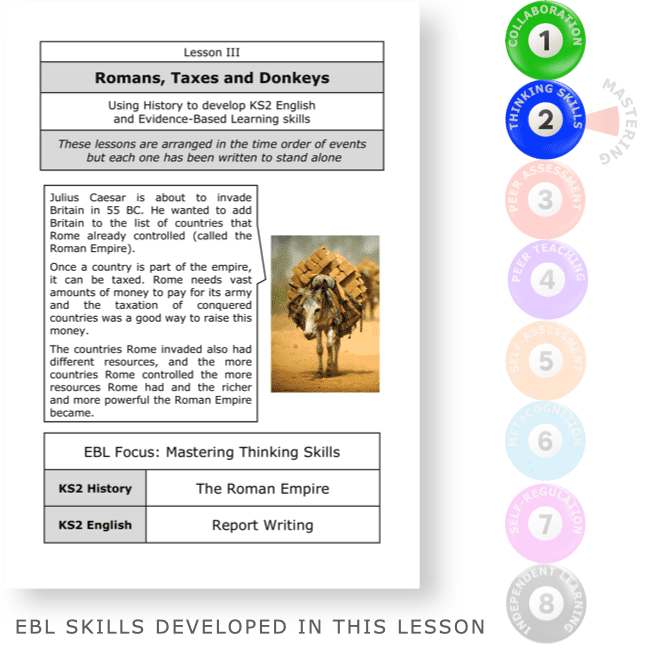 £3.00Add to basket
£3.00Add to basketJulius Caesar is about to invade Britain in 55 BC. He wanted to add Britain to the list of countries that Rome already controlled (called the Roman Empire). Once a country is part of the empire, it can be taxed. Rome needs vast amounts of money to pay for its army and the taxation of conquered countries was a good way to raise this money. The countries Rome invaded also had different resources, and the more countries Rome controlled the more resources Rome had and the richer and more powerful the Roman Empire became.
As well as English (writing a report) and history skills the Evidence-Based Learning skills developed in this lesson includes collaborative learning. This lesson also offers pupils the opportunity to master thinking skills.
VIEW -

 SAVE 25%
SAVE 25%Mastering EBL Skills through the Romans + PDF
£56.25 Add to basket £56.25Add to basket
£56.25Add to basketSave 25% when you buy all 25 lessons in this series:
- The Roman Army vs the Britons
- Why Caesar Wanted to Invade Britain
- Romans, Taxes and Donkeys
- Caesar Gets into Deep Water
- Caesar’s Dog Goes on Holiday
- Caesar’s Parrot Has An Awayday
- An Eagle-Bearer Saves the Day
- Eagle-Bearers in the Roman Army
- Nine Reasons Why Caesar Invaded Britain
- Did the Britons have a Spy?
- Caesar Sails Without his Cavalry
- Caesar’s Own Account of the Invasion
- A Roman Soldier’s First Day in Britain
- Two Days in August 55 BCE
- Caesar Forgot His Umbrella
- Caesar’s Three Big Problems
- Even More Problems for Caesar
- An Interview with Julius Caesar
- Did Caesar Make Too Many Mistakes
- Caesar Sails back to Gaul
- Caesar Has Big Plans
- A Roman Newspaper
- Did the Romans Win?
- It’s 54 BC and Caesar is Back
- Roman Warships
VIEW -

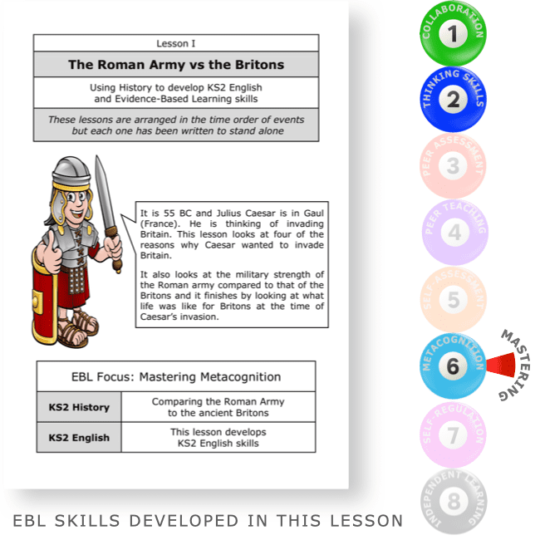
The Roman Army vs the Britons
£3.00 Add to basket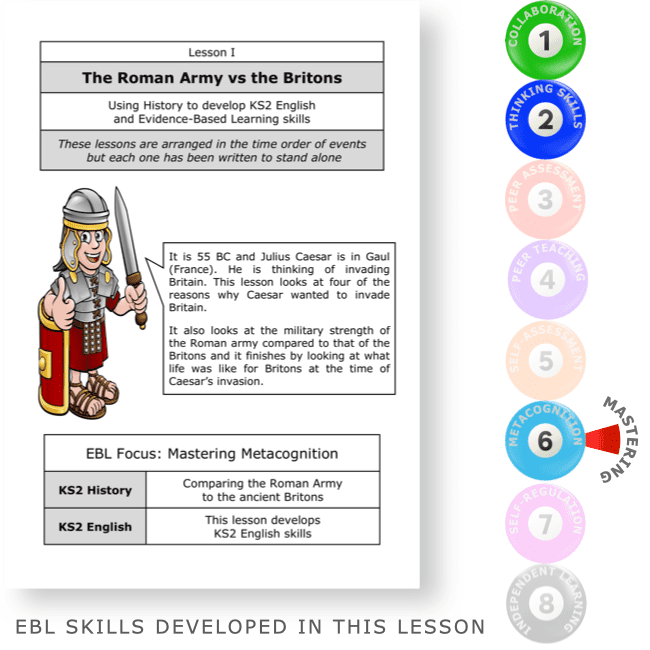 £3.00Add to basket
£3.00Add to basketIt is 55 BC and Julius Caesar is in Gaul (France). He is thinking of invading Britain. This lesson looks at four of the reasons why Caesar wanted to invade Britain. It also looks at the military strength of the Roman army compared to that of the Britons and it finishes by looking at what life was like for Britons at the time of Caesar’s invasion.
As well as English and history skills the Evidence-Based Learning skills developed in this lesson include collaborative learning and thinking skills. This lesson also offers pupils the opportunity to master metacognition.
VIEW -
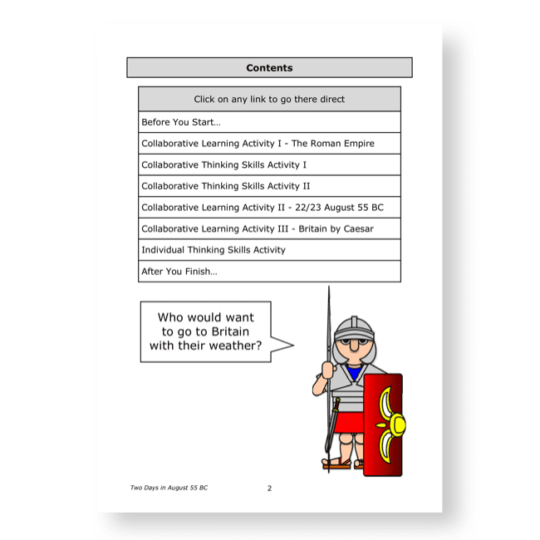
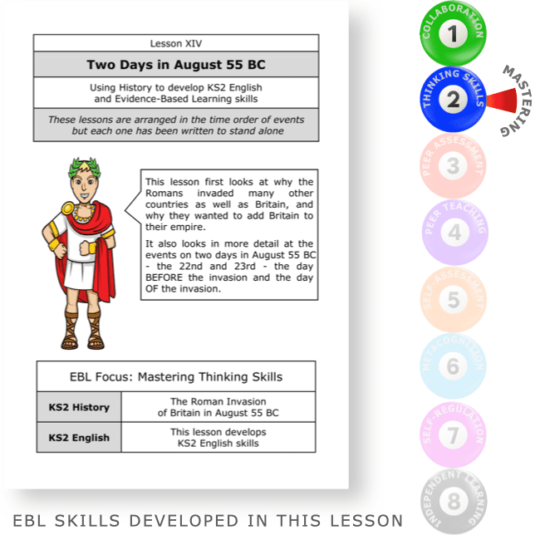
Two Days in August 55 BC
£3.00 Add to basket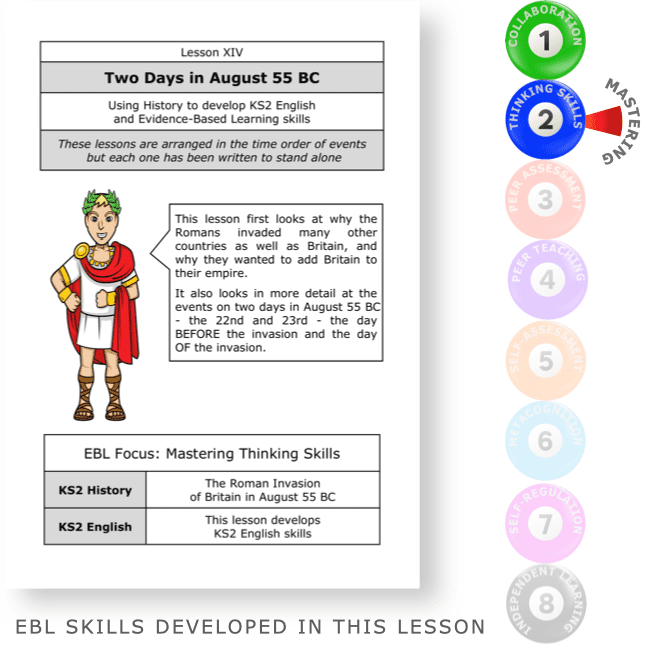 £3.00Add to basket
£3.00Add to basketThis lesson first looks at why the Romans invaded many other countries as well as Britain, and why they wanted to add Britain to their empire. It also looks in more detail at the events on two days in August 55 BC – the 22nd and 23rd – the day BEFORE the invasion and the day OF the invasion.
As well as English and history skills the Evidence-Based Learning skills developed in this lesson includes collaborative learning. This lesson also offers pupils the opportunity to master thinking skills.
VIEW -

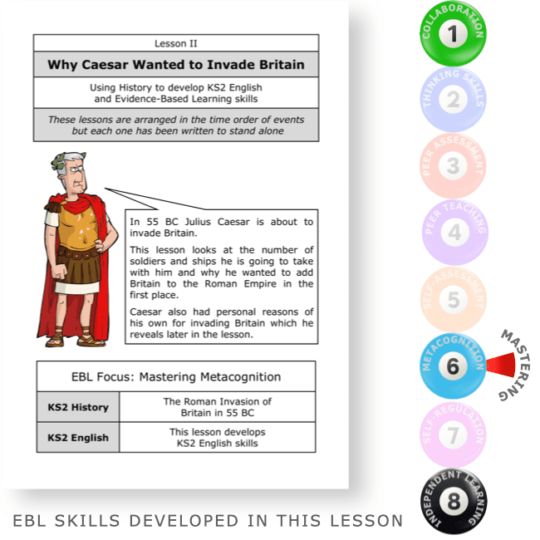
Why Caesar Wanted to Invade Britain
£3.00 Add to basket £3.00Add to basket
£3.00Add to basketIn 55 BC Julius Caesar is about to invade Britain. This lesson looks at the number of soldiers and ships he is going to take with him and why he wanted to add Britain to the Roman Empire in the first place. Caesar also had personal reasons of his own for invading Britain which he reveals later in the lesson.
As well as English and history skills the Evidence-Based Learning skills developed in this lesson include collaborative and independent learning. This lesson also offers pupils the opportunity to master metacognition.
VIEW -

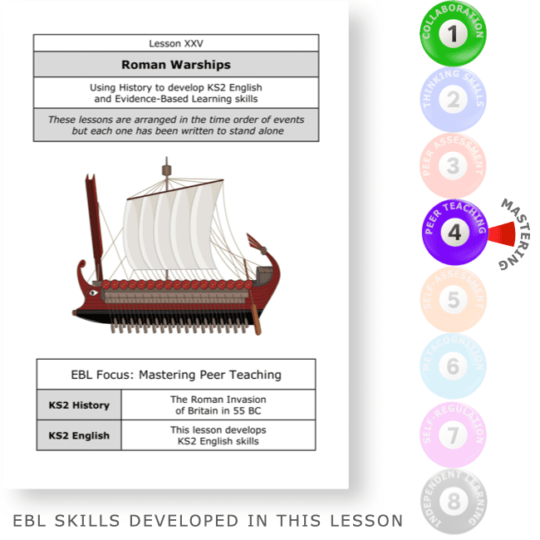
Roman Warships
£3.00 Add to basket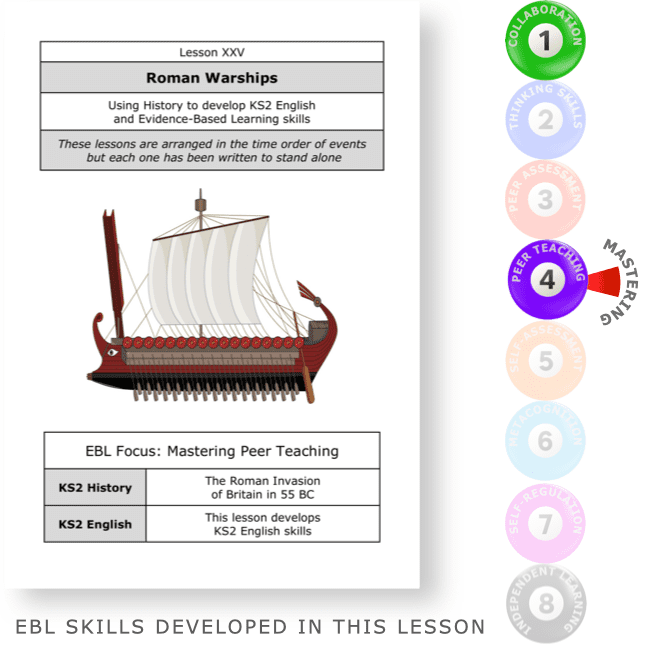 £3.00Add to basket
£3.00Add to basketThis lesson looks at the warships, especially the triremes, used by the Romans in their invasion of Britain in 55 BC. It also considers the fact that the Romans were brilliant copycats.
As well as English and history skills the Evidence-Based Learning skills developed in this lesson includes collaborative learning. This lesson also offers pupils the opportunity to master peer teaching.
VIEW
